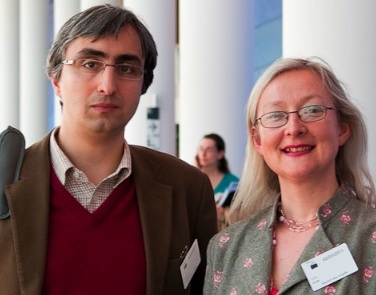CONFERENCE | by Camilla Azzini
Left Behind – Brussels Conference: Louise Ryan & Alessio D’Angelo
 LOUISE RYAN
LOUISE RYAN
Biographical note:
Louise Ryan is a Reader in Gender and Migration and Co-Director of the Social Policy Research Centre at Middlesex University. She has published widely on issues relating to gender, ethnicity, social networks and family migration. Her articles have appeared in Sociology, Sociological Review, Ethnic and Racial Studies, Journal of Ethnic and Migration Studies. She has produced several research reports on migrant and ethnic minority children in British schools. She is co-editor (with Wendy Webster) of ‘Gendering Migration: Masculinity, Femininity and Ethnicity in Post-War Britain’ (Ashgate, 2008).
ALESSIO D’ANGELO
Biographical note:
Alessio D’Angelo is a Lecturer in Social Sciences at Middlesex University. He has extensive experience in conducting both quantitative and qualitative research on a wide range of areas, including migration policy, migration statistics, ethnic diversity and identity, social exclusion and discrimination, service provision, community organisations and social networks. Recent research include large grants from the European Union, various British Research Councils as well as projects commissioned by Local Authorities, public bodies and charitable organisations. Alessio has also been working on a number of partnership initiatives with Third Sector and community organisations, including events, consultations and evaluations. In the last few years Alessio has been working on a number of projects focusing on the experiences of young migrants in schools, including two projects on “Polish Children in London Primary Schools”, one on “Newly arrived migrant and refugee children in the British educational system” and the production of a “Guide to Schooling in England for Newly Arrived Migrant Parents”.
Abstract of presentation:
‘Family Migration: the role of children and education in family decision-making strategies of Polish Migrants in London’
EU enlargement in May 2004 brought large scale and unanticipated migration from Eastern Europe, especially Poland. In Britain, almost 600,000 Polish people registered with the Workers Registration Scheme. While the majority of these were single adults, over time it became apparent that family reunion was taking place. Little was done by the UK government to prepare for these new forms of migration, particularly the needs of family members e.g. for education. Data sources suggest large numbers of Polish children arriving in British schools – there are now over 26,000 school pupils in England whose first language is Polish. Using qualitative data from three studies, our presentation examines the decision making processes of Polish parents about bringing children to the UK or leaving them behind in Poland.

